There's always a bee, or something
This one is about leaving things better than how we found them, and remembering we did so.
My sibling and I have birthdays in the same month, his before mine (which was confusing to other kids, as they are notably younger than I am). As I write this, mine is still upcoming and his has recently happened. They turned 35 this year, which underlines time in a way that anyone who once knew a baby who is now a full adult is aware of.
Our lives are pretty different, as most people's are, related or not. Our brains have a lot of similarities though, and in that way it's nice I've got seven years on them. I started getting serious about using a planner and lists as an outside source of memory and organisation at about their age so I was able to give him some tips and tricks that hopefully set them up for reaching where I'm at a bit earlier.
How it started/how it's going
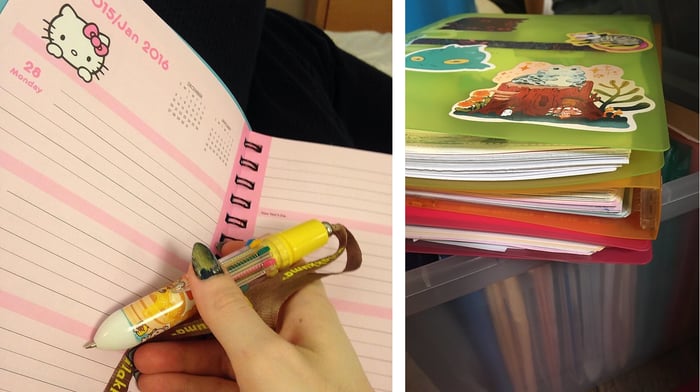 Image description: A side-by-side image. Left side shows an empty Hello Kitty planner for 2016 and a hand holding a multi-colour click pen. Right side shows a stack of three packed-full binders in neon colours on top of a file box. End ID.
Image description: A side-by-side image. Left side shows an empty Hello Kitty planner for 2016 and a hand holding a multi-colour click pen. Right side shows a stack of three packed-full binders in neon colours on top of a file box. End ID.
That's kind of the energy, isn't it? Doing the best we can so that those behind us can maybe have a bit of a better time when they get to it. I mean, I'm fully aware of how often people pull up the ladder behind them, but that's rather not the thing one should be doing, I think. I don't know which scout motto is about leaving a place better than you found it but I've found it's a lovely practise to keep in mind beyond camping or hiking.
I work in DAM, to some extent, which is "data asset management," but in practise is sort of like being an invisible librarian. When I'm training people in tools, or to support my work, I bring up that scout thing a lot. If you're dealing with a piece of data, then why not leave it a little nicer than you found it? It's easier, for future you, to basically remove it from future cleanup projects (which are always quite big enough on their own). I also use phrases like "oh, well since I'm up to the elbows [in this data], I might as well take care of that," or more colourful phrases that might indicate the spreadsheets I'm working on have guts and organic parts. But it's all the same thing, just do it while you see it or you'll forget.
And if I haven't written it down I may well.
I've already talked about the importance of silly little memories and the System I have for remembering them. Something I didn't touch on then was that part of my whole planner thing is writing down what I've done, either creative-project-wise, or outings or whatever. I summarise it all at the end of each month and then the end of each year too, but that's more a me bad memory thing. It really is that goofy but often effective thing of writing down things you're happy about and putting them in a jar or something like that.
There was a thing I did, over a decade ago, where I took a picture every day of something happy. Like the "good moments in a jar" thing, it's just a format to encourage one to be present. Goofy but works, often. Also gets overblown often as a way to "find happiness." Like girl, you are just identifying the joy, like it's a bird. You aren't putting more birds in your life. There's always birds, we just aren't always in a place to spot them.
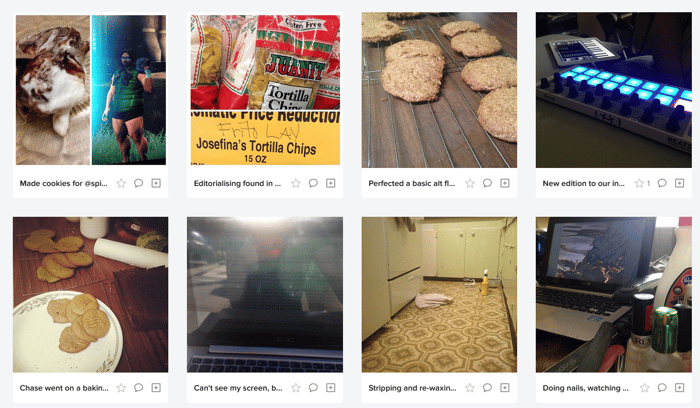 Image description: A screencap of a Flickr album page showing two rows of four photo thumbnails that range from cookies on cooling racks and a clean linoleum floor to pictures of screens of games and shows. End ID.
Image description: A screencap of a Flickr album page showing two rows of four photo thumbnails that range from cookies on cooling racks and a clean linoleum floor to pictures of screens of games and shows. End ID.
The thing about tracking moods, tracking accomplishments or fruitfulness, over nearly a decade of planners--the thing is you can see it's not always good. That often there are times it is quite bad, actually. That finding the good and the joys can be like panning for gold.
Actually, is this a thing kids who are not from the West do? During some grade school point you are learning about pioneers or the gold rush, or whatever theme has been simplified for eight-year-olds. And you learn about how gold panning works, often in a plastic pool with aluminum pie tins (not everyone has a reenactment mining town to go field trip at, thanks). It's difficult! Not just because you are eight, but because it's a lot of sand and gravel and not a lot of the shiny stuff.
That's life though, you have to work to find the smallest joys and they're easy to lose in the sand and muck of it all. Writing it down, taking a picture, that can help lock it in. Something something studies I'm sure about how bad memories have more staying power. And when it's all kind of shit it is difficult to be like, happy you finally nailed that cookie recipe, or saw a bee going head deep in a flower, or got a new score in that stupid game you love.
It's important though, to not lose those moments. Most especially when things are bad. If you get holiday cards from me you probably have seen some version of "I hope you are finding small moments of brightness." It's been a difficult time for the people I know and love. It's been a difficult time for some time. But we do keep trying to leave things better than we found them, to identify that stupid bird in hopes we notice more birds next time.
Links go to the Storygraph entries for each title, a great place to check out content warnings and find ways to read them.
- I read The Hunger Games books for the first time last year, which was perfect timing for the prequel that recently came out. It made me think about good "fourth books," the book that is published after a trilogy and is either a prequel that slaps in how it presents the upcoming events of said trilogy (and then changes how you read the original books), or something set far after that also does work reshaping what the original story did. Anyway, all that to say, it's time to re-read Ursula K. Le Guin's Earthsea trilogy again so I can fall into Tehanu, which is one of those fourth books that does its job exceedingly well.
- As I'm always harping on the worth of reading middle grade books and revisiting things one loved when young, if it's been a minute (or ever) since you read The Phantom Tollbooth by Norton Juster, it's a worthy revisit. Lot of things in here I still think about on the regular.
Here are some small joys in snapshots. For context for the first, the grounds around La Brea Tar Pits are a lovely park and studded all over with cones to warn you where the ground is seeping black stuff and is, well, gooey (or sticky, there are cones that say "sticky" too).
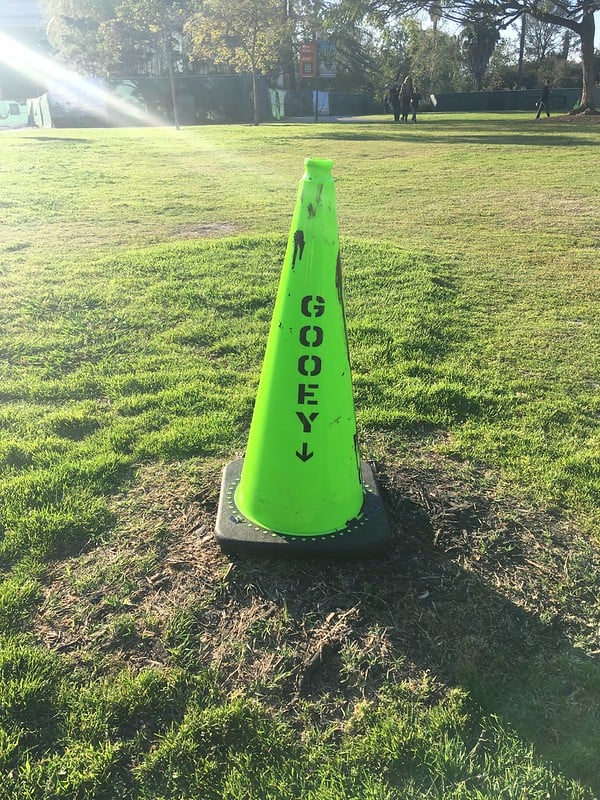 Image description: A photo of a neon yellow cone on what looks like an unassuming patch of brownish grass in a field. The cone has a little black stuff spattered on it and is stencilled with "GOOEY." End ID.
Image description: A photo of a neon yellow cone on what looks like an unassuming patch of brownish grass in a field. The cone has a little black stuff spattered on it and is stencilled with "GOOEY." End ID.
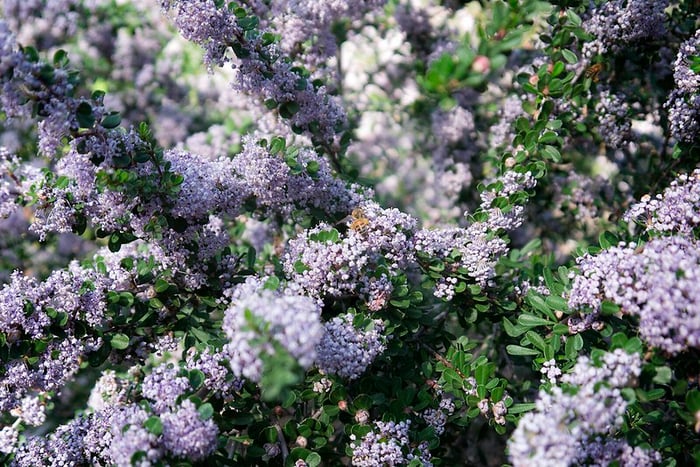 Image description: A close-up photo of bunches of tiny white-purple flowers filling the image. A single bee is head down in the centre of the image, presumably slurping up nectar. End ID.
Image description: A close-up photo of bunches of tiny white-purple flowers filling the image. A single bee is head down in the centre of the image, presumably slurping up nectar. End ID.
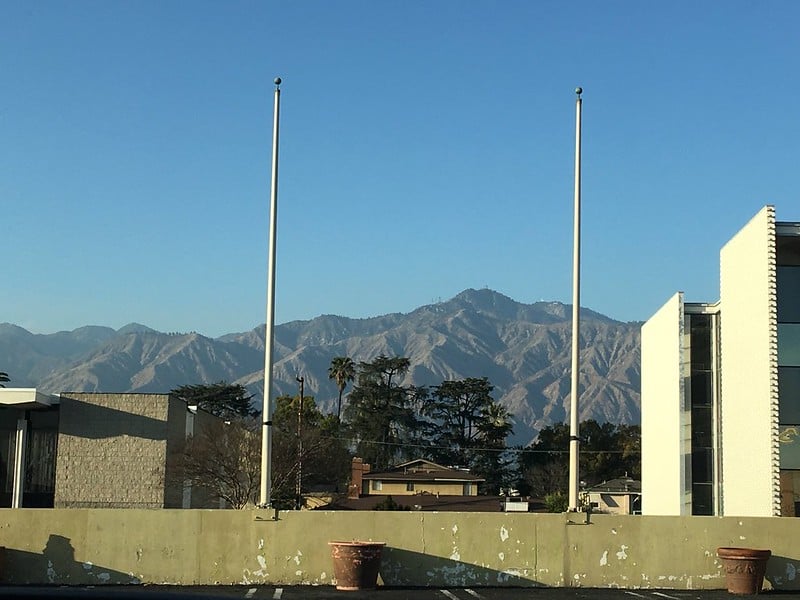 Image description: A photo taken from a kind of beat-up looking parking lot on the top of a building. Two empty flagpoles on the wall frame a hazy lovely view of the San Gabriel mountains. End ID.
Image description: A photo taken from a kind of beat-up looking parking lot on the top of a building. Two empty flagpoles on the wall frame a hazy lovely view of the San Gabriel mountains. End ID.
Some little joys of links:
- It's spring and therefore: bees. Via one of the wonderful scientists I follow I encountered this wonderful Guide to building and managing a mason bee hotel, which has a bunch of useful info! I haven't any outdoor space but I'm bookmarking this for if I someday do.
- I really enjoyed this article in Reactor, How History Can Be Used in Fiction: The Borgias vs. Borgia: Faith and Fear by Ada Palmer. I liked the use of the term "historicity" and the focus less on "accuracy" but truth-based vibes. It makes me think of the line from Michael Livingston's A Knight’s Tale is the Best Medieval Film (No, Really) "Not one bit of it is accurate to history, yet it’s oh so perfectly historical."
- Shattered Sidewalks of the Human Heart by Sam J. Miller over at Clarkesworld is a short story about King Kong and New York and planting the seeds to change things.
If you've thought of donating eSims, this guide was very helpful, and Crips for eSims for Gaza is a good option if you can't easily manage topping them up. There are also more traditional donation targets like the Palestine Children's Relief Fund, UNRWA, and Doctors Without Borders. If you prefer giving directly to families, Gaza Funds is a nice resource that facilitates finding campaigns.
Add a comment: